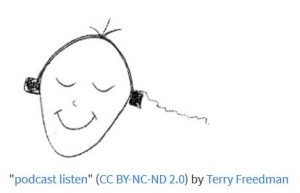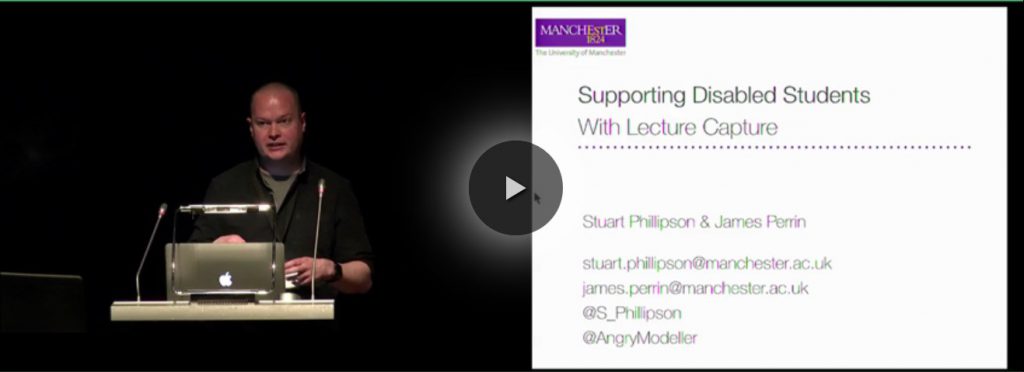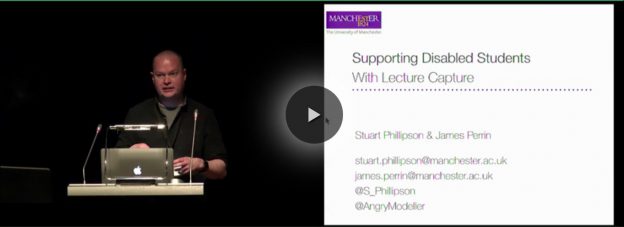Lecture capture is a subject that often generates healthy discussion (and often debate) across academic communities and over the last few years we’ve seen the emergence of a range of differing approaches. Some institutions have embedded lecture capture into policy in order to adopt a more universal way of embedding anticipatory arrangements as part of their equalities duties.
Others have adopted it as a way of managing the changes to Disabled Students Allowance (DSA) that have had an impact on English domiciled learners, particularly where reduction in funding for individual learners has placed additional responsibility on institutions to deliver non-medical personal help. However there is a growing acknowledgement that as well as providing individual support for individual students with disabilities, lecture capture can offer learning support solutions for a wider demographic, and where this is embedded and promoted widely as a resource for all learners, can provide a greater return on investment.
In her blog Opt-in? Opt-out? Is this the question? Sue Watling Academic Advisor for Technology Enhanced Learning at the University of Hull discusses the value of a proactive approach in order to meet anticipatory duties, asserting the fact that in the absence of inclusive practice at source runs the risk of excluding people.

In this guest blog Stuart Phillipson Media, Technologies Coordinator at the University of Manchester talks about the institution’s pro-active approach in supporting disabled students with lecture capture, and describes the impact that this has made for learners.
Opt-out lecture capture at the University of Manchester
For a few years we’ve been running an opt-out lecture capture service, this has gone fairly well, and this year our opt-out rate is down to 18%. However this presents a problem to students with dyslexia and other disabilities as some of their lectures still weren’t being recorded. We believe that if a room is equipped for lecture capture then it could be viewed as a reasonable adjustment to make a recording for these students if possible. As a result we have now extended our lecture capture offering so that if a student is prescribed recordings by our Disability Advisory Support Service (DASS), any opted-out lecture is recorded, but only for those specific DASS registered students.
Learner feedback
Although we have only been providing the extra recordings for one semester, our recent survey indicates that the results are viewed very positively by students. 84% of DASS students are using the additional recordings often, over 82% view the recordings as essential to their education and 90% believe having access to additional recordings will improve their examination results. The free text comments from students were especially positive:
“Makes it much more accessible and I feel more included and a valued member of the university”
“Completely transformed how I am able to learn”
“SO helpful; means if i am struggling in the lecture with my issues, I don’t feel like I am at a disadvantage, which often you do feel!“
“This was genuinely a life saver for me this semester as I missed majority of lectures due to problems arising outside of my control“
I wouldn’t say that we have solved all the accessibility problems around lecture capture, and we are currently testing automated subtitling and its limitations. However, lecture capture is provided in addition to, rather than instead of other support resources. For example, if a student is profoundly deaf and required lecture transcripts, this would be done by a dedicated note taker rather than as part of the lecture capture service. This might not be perfect, but our approach has been a fast and widely used method of improving educational equity here at Manchester.
We plan to open source our method of managing the recording process (as part of the Opencast system) later this year, with the hope that other Universities might be able to realise similar results.
Learn more about lecture capture at the University of Manchester
Follow this link to listen to Stuart describe the lecture capture service the University of Manchester at the 2017 Opencast Community Summit.

Margaret McKay, subject specialist: accessibilty and inclusion.

